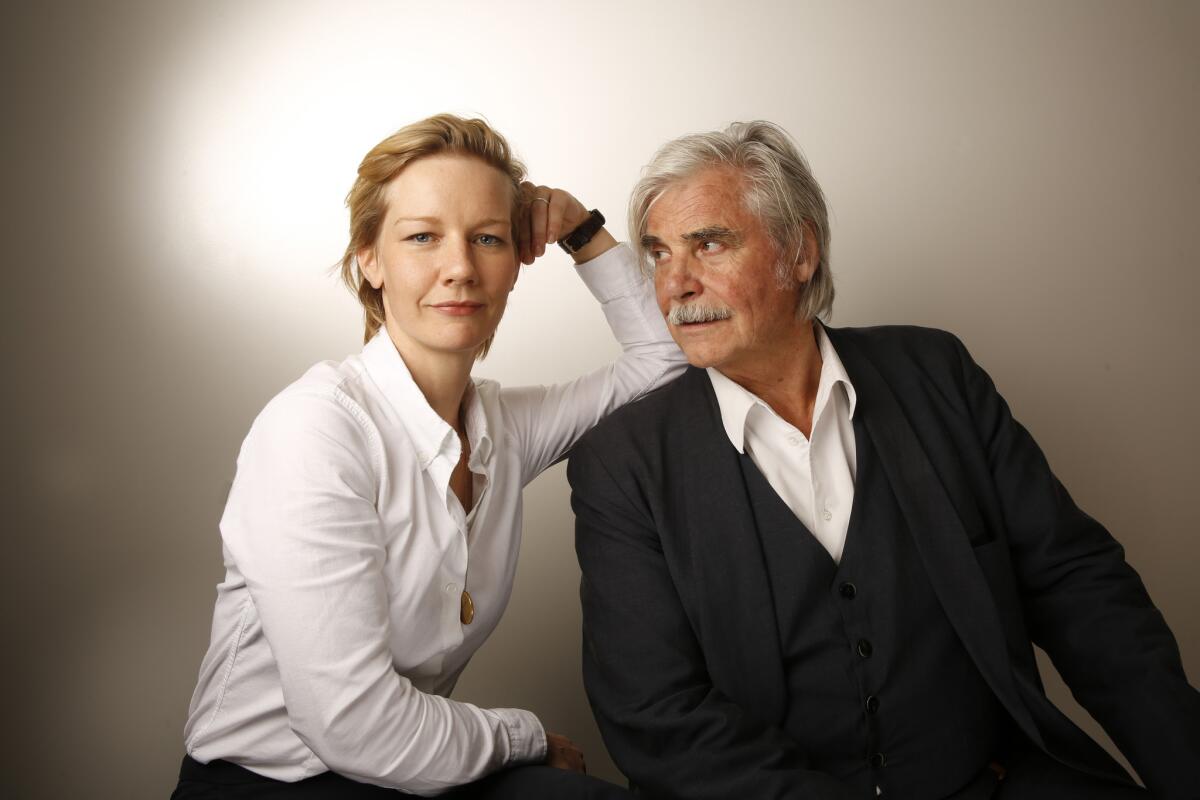Newsletter: Indie Focus: Searching and finding with ‘Silence,’ ‘Hidden Figures,’ ‘Toni Erdmann’ and ‘Julieta’
- Share via
Hello! I’m Mark Olsen, and welcome to your weekly field guide to a world of Only Good Movies.
Yes, it is a major holiday. But have you checked the movie listings? There are some just incredible titles hitting theaters right now — Hollywood squeezed some four releases dates out of the week around Christmas — including movies that have been playing the festival circuit for months and months and others that have only recently premiered. It truly is a world of non-stop movies. (Movies non-stop.)
Our awards season roundtables are still being unveiled too. The latest to become available finds my colleague Amy Kaufman and myself talking to six of the year’s most notable supporting actresses: Naomie Harris for “Moonlight,” Felicity Jones for “A Monster Calls,” Nicole Kidman for “Lion,” Aja Naomi King for “The Birth of a Nation,” Octavia Spencer for “Hidden Figures” and Michelle Williams for “Manchester by the Sea.” It was quite a group.
And there are videos up from my recent post-screening Q&A with Nicolas Winding Refn and Cliff Martinez talking about music and “The Neon Demon.” We will have more events soon here: events.latimes.com.
‘Silence’
Speaking personally, Martin Scorsese is one of my absolute favorite directors, and I will watch anything he makes. Where he leads, I will follow. His new film, “Silence,” is ready-made for this time of year, a tale of religious faith and deep spiritual questioning. An adaptation of the novel by Shūsaku Endō, the story puts two Portuguese priests (Andrew Garfield, Adam Driver) in 17 century Japan with the goals of finding a colleague (Liam Neeson) who reputed to have renounced his faith and attempting to further spread their gospel.
Justin Chang’s review for The Times is simply a stunning piece of work, digging deep into the movie and grappling with its issues of faith. As he wrote, “This anguished, contemplative new movie, which he spent nearly three decades coaxing into celluloid reality, carries the weight of a career summation. … Miraculously, that weight doesn’t crush the movie; it exalts it.”
Jen Yamato — who we here on the Indie Focus desk are excited to have joining us at The Times in the new year — had a pointedly different take on the film as her last piece at the Daily Beast. Taking issue with the way Scorsese privileges the point-of-view of the Christian priests over anyone else, Yamato powerfully wrote “for skeptics and non-believers, the 161-minute tale of the spiritual struggle quietly raging within one white savior out of water in feudal Japan is a frustrating journey to take — and an ardent story about cultural imperialism and Western arrogance that doesn’t recognize its own.”
Somewhat splitting the difference, at the New York Times, Manohla Dargis wrote “The film’s solemnity is seductive — as is Mr. Scorsese’s art — especially in light of the triviality and primitiveness of many movies, even if its moments of greatness also make its failures seem more pronounced.”
For the Times, Steven Zeitchik wrote about the long process of bringing the story to the screen.
And the New York Times Magazine had a long profile of Scorsese by Paul Elie on the filmmaker’s connection to the work. “I don’t know if there’s redemption, but there is such a thing as trying to get it right,” Scorsese said. “But how do you do it? The right way to live has to do with selflessness. I believe that. But how does one act that out? I don’t think you practice it consciously. It has to be something that develops in you — maybe through a lot of mistakes.”
‘Hidden Figures’
If you’re part of a family trying to find a movie the whole family can get out of the house to see, “Hidden Figures” is a pretty solid something-for-everybody pick. A feel-good movie in the absolute best sense, it tells the little known story of a group of African American women who were a vital part of the NASA team that first launched U.S. astronauts into space, working as mathematicians and engineers. You’d be hard-pressed to find a more likable trio than the film’s Taraji P. Henson, Octavia Spencer and Janelle Monáe, with additional supporting turns by Kevin Costner, Kirsten Dunst and Mahershala Ali. (Among the astronauts is John Glenn, who died just earlier this month, played by Glen Powell from “Everybody Wants Some!!”)
In his review for The Times, Kenneth Turan wrote “like the calculating women whose lives it celebrates, ‘Hidden Figures’ knows what it’s doing. … A Grade-A Hollywood crowd-pleaser that happily celebrates its shameless moments, ‘Hidden Figures’ can be teased but it can’t be ignored.”

At the Washington Post, Ann Hornaday called the film “a shot of distilled, exhilarating joy” and went on to note its sneaky political power, when she noted, “Just as family and marriage pointed up the pathology of racism in ‘Loving,’ this movie adroitly portrays the sheer waste and inefficiency of racism and misogyny. Just think how much has been lost, the movie suggests, over centuries of depriving ourselves of the brains, talents and leadership of more than half our population?”
‘Toni Erdmann’
Germany’s submission for the foreign-language Oscar and a movie that has been storming through critics’ year-end best lists and that recently won five top prizes at the European Film Awards, German writer-director Maren Ade’s “Toni Erdmann” is a very funny film that also manages some deep emotional notes and even a strikes points against the contemporary office culture and its treatment of women. A workaholic woman (Sandra Hüller) is visited by her estranged father, who soon assumes an outsize comic persona and won’t let it drop. Soon she is dropping her defenses, as one comedic misadventure after another has her rethinking her priorities. (And Hüller has a show-stopping song that must be seen to be believed.)
Reviewing the film for The Times, Justin Chang wrote “were this simply the story of a no-nonsense career woman and her screw-loose dad overcoming their estrangement through a broad style of performative therapy, it might have furnished a snappy assembly-line crowd-pleaser, with every laugh, tear and epiphany planted to erupt on cue. But ‘Toni Erdmann’ is weirder, messier and vastly more intricate than that. Ade has an unusual gift for planting more than one idea in each frame; I don’t think there’s a single one of the movie’s 162 minutes that can be reduced to a single emotional beat or narrative function. That hefty running time isn’t a sign of indulgence, but integrity.”

At the New York Times, A.O. Scott called the film “by a wide margin the funniest almost-three-hour German comedy you will ever see.” He added that the film “is its own kind of rebellion, a thrilling act of defiance against the toxicity of doing what is expected, on film, at work and out in the world”
Ade sat for a long conversation with critic Amy Taubin while at the New York Film Festival last fall.
‘Julieta’
“Julieta,” the latest from two-time Oscar-winning Spanish filmmaker Pedro Almodóvar, was recently left off the shortlist to move forward in the race for this year’s foreign-language Academy Award. (“Toni Erdmann” made the cut.) But “Julieta” is nevertheless an exciting movie, something new from someone who could easily be just churning them out or giving up altogether. With a quiet, building power, the film looks at the emotional history of one woman, played by Emma Suárez and Adriana Ugarte at different stages in her life.
For The Times, Justin Chang called the film “radiant and absorbing,” going on to add that “the movie may not have the audacity and emotional grandeur of a new Almodóvar masterpiece, but in every particular — its seamless manipulation of time, its sly infusions of comedy, its expert direction of actors and, yes, its fabulous wallpaper — it confirms his mastery nonetheless.
In the Village Voice, Bilge Ebiri wrote: “Both a film noir and a candy-colored confection, Pedro Almodóvar’s ‘Julieta’ is one of the most absorbing films he’s made in years. It’s also, perhaps, one of the saddest.”
I recently spoke to Almodóvar for an article I will be publishing soon. And L.A.’s Cinefamily just announced a complete retrospective of his work starting early next month.
Email me if you have questions, comments or suggestions, and follow me on Twitter @IndieFocus.
More to Read
Only good movies
Get the Indie Focus newsletter, Mark Olsen's weekly guide to the world of cinema.
You may occasionally receive promotional content from the Los Angeles Times.











